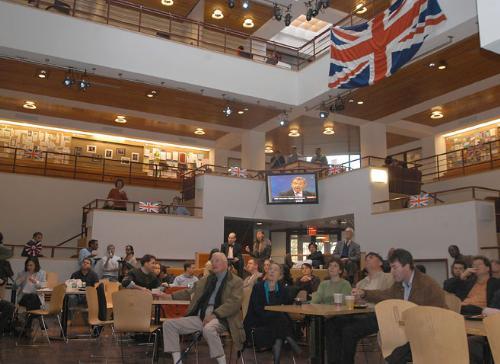
News
Summers Will Not Finish Semester of Teaching as Harvard Investigates Epstein Ties

News
Harvard College Students Report Favoring Divestment from Israel in HUA Survey

News
‘He Should Resign’: Harvard Undergrads Take Hard Line Against Summers Over Epstein Scandal

News
Harvard To Launch New Investigation Into Epstein’s Ties to Summers, Other University Affiliates

News
Harvard Students To Vote on Divestment From Israel in Inaugural HUA Election Survey
Students Watch UK Elections
British students, Bostonians gather at the IOP to cheer on PM candidates

They consumed beer and pizza and vented about the Red Sox, but for the nearly 100 people packed into the John F. Kennedy, Jr. Forum at the Kennedy School of Government (KSG) last night, it was strictly a British affair.
Political aficionados from Harvard and throughout the Boston area gathered together yesterday for “U.K. Election Night 2005,” an event sponsored by the KSG’s U.K. Student Caucus.
But the election proved disappointing for those who were looking for a neck-and-neck race. Exit polls released throughout the evening showed current Labour Party Prime Minister Tony Blair comfortably poised for a historic third term.
For some, monitoring the election from across the Atlantic was more about culture than politics.
“The British community at Harvard tends to integrate very well into the greater Harvard community,” said Her Majesty’s Consul-General in Boston John Rankin. “Nevertheless, we have certain values and interests and it’s great to have this election night to bring those together.”
Andrew J. Whitehouse, president of the KSG’s U.K. Student Caucus, said one of the reasons he coordinated the event was to nurture this sense of community.
“It’s very exciting for students from the U.K. to feel a part of home and to have the opportunity to see the results come in live from their constituencies,” he said.
First-year KSG student James A. Crabtree, who sported an “I Love Tony” t-shirt throughout the evening, said he had been looking forward to Election Night “for ages.”
“Having watched [the United States’] election, I thought it was about time that I got to watch my own,” he said. “Being away from your home country you rather look forward to moments when you can get into a bit of your own politics.”
Seated under U.K. flags and banners, the audience alternated between cheers and boos as the future members of Parliament appeared on BBC to deliver their victory speeches.
In the end, Blair’s Labour Party was expected to lose 66 seats in Parliament, something analysts attributed to the weakening support for the Iraq War, which the Labour Party endorsed.
William S. Marshall, a research fellow at KSG’s Belfer Center for Science and International Affairs and supporter of the Liberal Democrats Party, said he thought Blair’s expected victory would prove “problematic” for the United Kingdom.
“Essentially, people are anti-British right now because of the war [in Iraq],” he said. “If we re-elect Blair after he has gone to war, then we as the electorate have essentially authorized the war.”
Thomas Wright, also a research fellow at the Belfer Center, said he was pleased by Blair’s likely victory.
“I was hoping he would win,” said Wright, who is a native of Ireland. “I’m slightly disappointed that the majority wasn’t larger, but I think he’s a strong leader.”
The event also featured a handful of live interviews with pundits, politicians, and journalists who weighed in on election developments over the phone.
In one interview, a BBC journalist was asked how she would explain a U.K. general election to those who weren’t familiar with the process.
“We don’t have any hanging chads here,” she quipped.
—Staff writer Javier C. Hernandez can be reached at jhernand@fas.harvard.edu.
Want to keep up with breaking news? Subscribe to our email newsletter.
